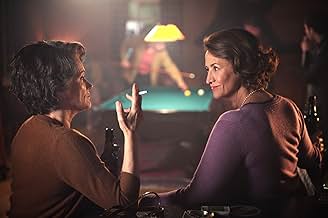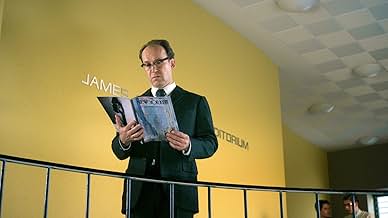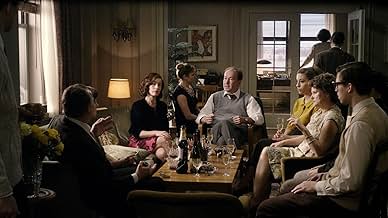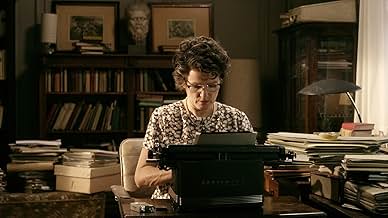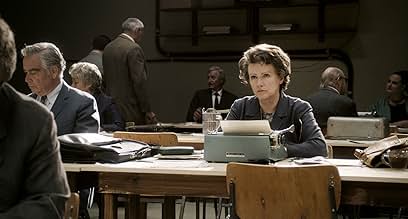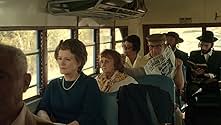AVALIAÇÃO DA IMDb
7,1/10
12 mil
SUA AVALIAÇÃO
Um olhar sobre a vida da filósofa e teórica política Hannah Arendt, que relatou para The New Yorker sobre o julgamento do líder nazi Adolf Eichmann em Jerusalém.Um olhar sobre a vida da filósofa e teórica política Hannah Arendt, que relatou para The New Yorker sobre o julgamento do líder nazi Adolf Eichmann em Jerusalém.Um olhar sobre a vida da filósofa e teórica política Hannah Arendt, que relatou para The New Yorker sobre o julgamento do líder nazi Adolf Eichmann em Jerusalém.
- Direção
- Roteiristas
- Artistas
- Prêmios
- 8 vitórias e 18 indicações no total
Leila Lallali
- Student Laureen
- (as Leila Schaus)
- Direção
- Roteiristas
- Elenco e equipe completos
- Produção, bilheteria e muito mais no IMDbPro
Avaliações em destaque
The film "Hannah Arendt" depicts an intriguing and contradictory intellectual but avoids examining the political core of the famous controversy it recounts. Arendt stirred a furor with her 1963 writings on the Israeli government's trial in Jerusalem of the Nazi Adolf Eichmann. She characterized Eichmann, who had organized the transport of European Jews to the death camps, as a banal bureaucrat rather than a singular monster. She wrote that European Jewish leaders, too, were responsible, by administering submission to the Nazis when even futile resistance and chaos might have allowed more Jews to survive. The public attacks on Arendt are shown. She was pilloried, particularly by Jewish intellectuals, as an unfeeling Nazi sympathizer and self-hating Jew. The New School's move to fire her is also enacted.
But the film, which shows Arendt as shocked to learn that she has hurt the feelings of many Jews, including long-time friends, does not reveal that she had broken with the Zionist leaders in 1942 when they called for a Jewish state rather than the bi-national Palestine she supported. The Zionists opposed measures to rescue Jews from the Nazis other than those that herded them to Palestine. They claimed, however, that their takeover of Palestine was all about saving Jews from a unique evil -- a claim unchallenged by most liberals as well as the Stalinist left. Arendt's analysis hit the Zionists' guilty conscience and undermined the rationale for their nationalist project. The film ignores these crucial political elements, and presents Arendt's strong defender and friend only as novelist "Mary" without disclosing that Mary McCarthy was an anti-Stalinist and anti-Zionist who called Zionism the "Jewish final solution."
Director Margarethe von Trotta's failure to explore this relevant history leaves her film interesting but superficial when it could have been brave and timely. Arendt's famous topic, thoughtless compliance with evildoers in power, needs our attention today more than ever. Fifty years after the "Banality of Evil" controversy, U.S. liberals and progressives are blindly uncritical of a leader who spies on millions and remotely executes foreigners and citizens in the name of national security. A militarily mighty Zionist state is still free to massacre innocents, shielded by this unquestioned U.S. power and the old sacred cow that Israel is the only safe haven for Jews. Arendt might have had some juicy comments about the "banality of filmmaking."
Rita Freed
But the film, which shows Arendt as shocked to learn that she has hurt the feelings of many Jews, including long-time friends, does not reveal that she had broken with the Zionist leaders in 1942 when they called for a Jewish state rather than the bi-national Palestine she supported. The Zionists opposed measures to rescue Jews from the Nazis other than those that herded them to Palestine. They claimed, however, that their takeover of Palestine was all about saving Jews from a unique evil -- a claim unchallenged by most liberals as well as the Stalinist left. Arendt's analysis hit the Zionists' guilty conscience and undermined the rationale for their nationalist project. The film ignores these crucial political elements, and presents Arendt's strong defender and friend only as novelist "Mary" without disclosing that Mary McCarthy was an anti-Stalinist and anti-Zionist who called Zionism the "Jewish final solution."
Director Margarethe von Trotta's failure to explore this relevant history leaves her film interesting but superficial when it could have been brave and timely. Arendt's famous topic, thoughtless compliance with evildoers in power, needs our attention today more than ever. Fifty years after the "Banality of Evil" controversy, U.S. liberals and progressives are blindly uncritical of a leader who spies on millions and remotely executes foreigners and citizens in the name of national security. A militarily mighty Zionist state is still free to massacre innocents, shielded by this unquestioned U.S. power and the old sacred cow that Israel is the only safe haven for Jews. Arendt might have had some juicy comments about the "banality of filmmaking."
Rita Freed
An intense look at the trouble life of philosopher and political theorist Hannah Arendt , who reported for The New Yorker on the war crimes trial of the Nazi Adolf Eichmann . It deals with her American personal experiences , as in 1950 , Hanna (Barbara Sukowa) became a naturalized citizen of the United States along with her husband Heinrich Blucher (Axel Milberg) . Arendt served as a visiting scholar at the University of California, Berkeley, Princeton University, and Northwestern University. In the spring of 1959, she became the first woman lecturer at Princeton ; Arendt also taught at the University of Chicago , The New School in Manhattan and Yale University . Furthermore , in the movie appears some flashbacks about her relationship with Martin Heidegger (Klaus Pohl) . Hanna was was a German-American political theorist as well as a prestigious philosopher . Arendt's work deals with the nature of power, and the subjects of politics, direct democracy, authority, and totalitarianism.
This is a brooding and thought-provoking biographic drama about the notorious philosopher focusing mainly the Eichman trial . Stands out the wonderful acting by Barbara Sukowa who is terrific in the title role . Support cast is frankly excellent such as Axel Milberg as her husband Heinrich Blucher , Janet McTeer as the writer Mary McCarthy and Julia Jentsch as her helper , the latter also starred another good film about Nazism titled ¨Sophie Scholl¨ . The motion picture was well directed by Margarethe Von Trotta and it belongs a trilogy dealing with Nazism , formed by ¨Roxa Luxemburg¨ also starred by Barbara Sukowa and ¨Rosenstrasse¨or Street of roses .
The picture is based on real events about Hanna Arendt life ; Arendt's first major book was entitled, The Origins of Totalitarianism (1951), which traced the roots of Stalinist Communism and Nazism in both anti-Semitism and imperialism . In her reporting of the Eichmann trial for The New Yorker, which evolved into Eichmann in Jerusalem : A Report on the Banality of Evil (1963), she coined the phrase "the banality of evil" to describe Eichmann. She raised the question of whether evil is radical or simply a function of thoughtlessness, a tendency of ordinary people to obey orders and conform to mass opinion without a critical evaluation of the consequences of their actions and inaction.Arendt was sharply critical of the way the trial was conducted in Israel. She also was critical of the way that some Jewish leaders, notably M. C. Rumkowski, acted during the Holocaust. This caused a considerable controversy and even animosity toward Arendt in the Jewish community. Her friend Gershom Scholem, a major scholar of Jewish mysticism, broke off relations with her. Arendt was criticized by many Jewish public figures, who charged her with coldness and lack of sympathy for the victims of the Shoah/Holocaust. Due to this lingering criticism, her book has only recently been translated into Hebrew.
This is a brooding and thought-provoking biographic drama about the notorious philosopher focusing mainly the Eichman trial . Stands out the wonderful acting by Barbara Sukowa who is terrific in the title role . Support cast is frankly excellent such as Axel Milberg as her husband Heinrich Blucher , Janet McTeer as the writer Mary McCarthy and Julia Jentsch as her helper , the latter also starred another good film about Nazism titled ¨Sophie Scholl¨ . The motion picture was well directed by Margarethe Von Trotta and it belongs a trilogy dealing with Nazism , formed by ¨Roxa Luxemburg¨ also starred by Barbara Sukowa and ¨Rosenstrasse¨or Street of roses .
The picture is based on real events about Hanna Arendt life ; Arendt's first major book was entitled, The Origins of Totalitarianism (1951), which traced the roots of Stalinist Communism and Nazism in both anti-Semitism and imperialism . In her reporting of the Eichmann trial for The New Yorker, which evolved into Eichmann in Jerusalem : A Report on the Banality of Evil (1963), she coined the phrase "the banality of evil" to describe Eichmann. She raised the question of whether evil is radical or simply a function of thoughtlessness, a tendency of ordinary people to obey orders and conform to mass opinion without a critical evaluation of the consequences of their actions and inaction.Arendt was sharply critical of the way the trial was conducted in Israel. She also was critical of the way that some Jewish leaders, notably M. C. Rumkowski, acted during the Holocaust. This caused a considerable controversy and even animosity toward Arendt in the Jewish community. Her friend Gershom Scholem, a major scholar of Jewish mysticism, broke off relations with her. Arendt was criticized by many Jewish public figures, who charged her with coldness and lack of sympathy for the victims of the Shoah/Holocaust. Due to this lingering criticism, her book has only recently been translated into Hebrew.
Although I was not familiar with the name "Hannah Arendt," I was certainly familiar with the phrase "banality of evil" that Arendt coined. However, "banality of evil" is not the phrase she used. The full phrase is "the fearsome, word-and-thought-denying banality of evil." Because, unlike the claims of many accusers who didn't fully understand her, Arendt didn't see a simple bureaucrat in Eichmann during his 1960 trial in Israel. She saw a truly evil man who "spoke like a bureaucrat." Her point being that Eichmann did not speak or seem to think like a genocidal maniac yet he acted like one nevertheless. That is evil cloaked in the banal. This movie revolves around the years of Arendt's life, 1960 to 1963, when she was formulating these ideas and in that, I think the movie probably has it right.
All that said, and these are certainly ideas worth mulling over, this is a film for ideas and for philosophy buffs, not for film buffs. Why do I say this? Because this movie is slow, at least for American audiences. The beginning is confusing. We see a woman in New York but we don't know the date. She speaks German. We see a man get off of a bus heading to "Victoria" in the middle of nowhere. He is promptly kidnapped. We don't know when or where. Eventually, we learn the kidnapped man is Adolph Eichmann who is nabbed by the Mossad in Argentina in 1960. Much of the movie unfolds slowly. This is a film about thinking. It is not about doing much or feeling much. It is an intellectual film.
There's one semi-action scene in the film where a 1950s vehicle corners Arendt on the road where she is walking. Israeli secret agents pour out of the car and threaten Arendt, trying to prevent her from publishing her book about Eichmann. Based on someone knowledgeable, Professor Roger Berkowitz, academic director of the Hannah Arendt Center for Politics and the Humanities at Bard College in New York, it appears this scene was invented out of whole cloth to try to give the film at least some suspense. But that's not what this film is about.
It's about thinking and it's about the fearsome, word-and-thought-denying banality of evil and how Hannah Arendt was the first to identify this 20th-century pathology of the human psyche.
Thanks to the Camera Cinema Club in San Jose for showing this film.
All that said, and these are certainly ideas worth mulling over, this is a film for ideas and for philosophy buffs, not for film buffs. Why do I say this? Because this movie is slow, at least for American audiences. The beginning is confusing. We see a woman in New York but we don't know the date. She speaks German. We see a man get off of a bus heading to "Victoria" in the middle of nowhere. He is promptly kidnapped. We don't know when or where. Eventually, we learn the kidnapped man is Adolph Eichmann who is nabbed by the Mossad in Argentina in 1960. Much of the movie unfolds slowly. This is a film about thinking. It is not about doing much or feeling much. It is an intellectual film.
There's one semi-action scene in the film where a 1950s vehicle corners Arendt on the road where she is walking. Israeli secret agents pour out of the car and threaten Arendt, trying to prevent her from publishing her book about Eichmann. Based on someone knowledgeable, Professor Roger Berkowitz, academic director of the Hannah Arendt Center for Politics and the Humanities at Bard College in New York, it appears this scene was invented out of whole cloth to try to give the film at least some suspense. But that's not what this film is about.
It's about thinking and it's about the fearsome, word-and-thought-denying banality of evil and how Hannah Arendt was the first to identify this 20th-century pathology of the human psyche.
Thanks to the Camera Cinema Club in San Jose for showing this film.
Other reviewers have questioned the historical accuracy of Margarethe von Trotta's portrayal of Hannah Arendt (Barbara Sukowa) and her opinion of the Jewish leaders as expressed in her NEW YORKER articles on the trial of Adolf Eichmann in 1961.
As a piece of film-making, however, HANNAH ARENDT grabs the attention and does not let go throughout its 113-minute running- time. As portrayed by Sukowa, Arendt comes across as a forthright person, not frightened of expressing her opinions and responding to any intellectual challenges from close friends such as Kurt Blumenfeld (Michael Degen). Yet beneath that tough surface lurks a profoundly disillusioned person, as she discovers to her cost that her great teacher and mentor Martin Heidegger (Klaus Pohl) does not practice what he preaches. Although insistent on reinforcing the distinction between "reason" and "passion," Heidegger takes the "passionate" decision to associate himself with the Nazi party, and thereby embraces their totalitarian values. Like Eichmnann himself, he chooses not to "think" but to commit himself to an ideology that actively discourages individual thought.
The sense of shock and disillusion Arendt experiences inevitably colors her view of the Eichmann trial. Director von Trotta includes several close-ups of her sitting in the press-room listening to the testimony of Eichmann, his accusers and the witnesses, a quizzical expression on her face, as if she cannot quite make sense of what she hears. She cannot condemn Eichmann, because he has simply followed Heidegger's course of action.
Once the articles have been published, Arendt experiences an almost unprecedented campaign of vilification. Although she is given a climactic scene where she defends herself in front of her students (and her accusers within the university faculty), we get the sense that she is only doing so on the basis of abstractions; her personal feelings are somehow disengaged. She is far more affected when her one-time close friend Hans Jonas (Ulrich Noethen) vows never to talk to her again on account of her views. Philosophers might be able to make sense of the world, but they often neglect human relations.
Consequently our view of Arendt, as portrayed in this film, is profoundly ambivalent. While empathizing with her views about the banality of evil, which reduces people to automata as they claim they were only carrying out orders, even while being involved in atrocities, Arendt herself comes across as rather myopic, so preoccupied with her ideas that she has little or no clue about how they might affect those closest to her. It's a wonder, therefore, that Mary McCarthy (Janet McTeer) chooses to stick with her through the worst of circumstances.
Ingeniously combining archive footage of the Eichmann trial with color re-enactments of what happened during that period, HANNAH ARENDT is a thought-provoking piece, even if we find it difficult to identify with the central character.
As a piece of film-making, however, HANNAH ARENDT grabs the attention and does not let go throughout its 113-minute running- time. As portrayed by Sukowa, Arendt comes across as a forthright person, not frightened of expressing her opinions and responding to any intellectual challenges from close friends such as Kurt Blumenfeld (Michael Degen). Yet beneath that tough surface lurks a profoundly disillusioned person, as she discovers to her cost that her great teacher and mentor Martin Heidegger (Klaus Pohl) does not practice what he preaches. Although insistent on reinforcing the distinction between "reason" and "passion," Heidegger takes the "passionate" decision to associate himself with the Nazi party, and thereby embraces their totalitarian values. Like Eichmnann himself, he chooses not to "think" but to commit himself to an ideology that actively discourages individual thought.
The sense of shock and disillusion Arendt experiences inevitably colors her view of the Eichmann trial. Director von Trotta includes several close-ups of her sitting in the press-room listening to the testimony of Eichmann, his accusers and the witnesses, a quizzical expression on her face, as if she cannot quite make sense of what she hears. She cannot condemn Eichmann, because he has simply followed Heidegger's course of action.
Once the articles have been published, Arendt experiences an almost unprecedented campaign of vilification. Although she is given a climactic scene where she defends herself in front of her students (and her accusers within the university faculty), we get the sense that she is only doing so on the basis of abstractions; her personal feelings are somehow disengaged. She is far more affected when her one-time close friend Hans Jonas (Ulrich Noethen) vows never to talk to her again on account of her views. Philosophers might be able to make sense of the world, but they often neglect human relations.
Consequently our view of Arendt, as portrayed in this film, is profoundly ambivalent. While empathizing with her views about the banality of evil, which reduces people to automata as they claim they were only carrying out orders, even while being involved in atrocities, Arendt herself comes across as rather myopic, so preoccupied with her ideas that she has little or no clue about how they might affect those closest to her. It's a wonder, therefore, that Mary McCarthy (Janet McTeer) chooses to stick with her through the worst of circumstances.
Ingeniously combining archive footage of the Eichmann trial with color re-enactments of what happened during that period, HANNAH ARENDT is a thought-provoking piece, even if we find it difficult to identify with the central character.
This is a fascinating look at Hanna Arendt, a German-American philosopher who in 1961 reported on the trial of Adolf Eichmann for the New Yorker. A huge controversy erupted.
Arendt left Germany in 1933 for France, but when Germany invaded France, she found herself in a detention camp. When the film begins, she is a happily married woman with friends such as the writer Mary McCarthy, and she is a professor at, among other places, the New School in New York City.
Hanna is very excited about covering the trial, but her husband, Heinrich, is afraid it will take her back to those dark days.
While observing Eichmann, Arendt is struck by the fact that he was an ordinary man with nothing special about him. This causes her to think about the nature of evil itself.
She decides that he's not a monster but a person who suppressed his conscience in order to be obedient to the Nazis. She thus created the concept of the "banality of evil."
She believed also that some Jewish leaders at the time had fallen into this trap and unwittingly participated in the Holocaust. Her critics failed to understand her meaning.
In some camps, her New Yorker articles were not well received, as she was seen as a heartless turncoat who blamed the victims. Hanna has to defend her ideas, and the price she pays for them is high.
Barbara Sukowa does a magnificent job as Arendt, showing the woman's brilliance, courage, affection for friends and family, and hurt when some people she loved turned against her.
It's surprising that she was met with as much disdain as she was -- but Arendt did not believe in blind adoration of any group. She took people on an individual basis.
As far as the banality of evil, evil has always had the ordinary face of people sitting back and doing what they're told. Or, as Martin Luther King said, doing nothing.
I'm sure many of us have experienced this in the workplace -- I know I did. It's then that you realize the true nature of most people. Everyone can say they have ethics - but do they have ethnics when they stand to lose something?
Beautifully directed by Margarethe von Trotta, who also co-wrote the screenplay. A difficult subject made clear, a complicated woman understandable -- no small feat. A thought-provoking film.
Arendt left Germany in 1933 for France, but when Germany invaded France, she found herself in a detention camp. When the film begins, she is a happily married woman with friends such as the writer Mary McCarthy, and she is a professor at, among other places, the New School in New York City.
Hanna is very excited about covering the trial, but her husband, Heinrich, is afraid it will take her back to those dark days.
While observing Eichmann, Arendt is struck by the fact that he was an ordinary man with nothing special about him. This causes her to think about the nature of evil itself.
She decides that he's not a monster but a person who suppressed his conscience in order to be obedient to the Nazis. She thus created the concept of the "banality of evil."
She believed also that some Jewish leaders at the time had fallen into this trap and unwittingly participated in the Holocaust. Her critics failed to understand her meaning.
In some camps, her New Yorker articles were not well received, as she was seen as a heartless turncoat who blamed the victims. Hanna has to defend her ideas, and the price she pays for them is high.
Barbara Sukowa does a magnificent job as Arendt, showing the woman's brilliance, courage, affection for friends and family, and hurt when some people she loved turned against her.
It's surprising that she was met with as much disdain as she was -- but Arendt did not believe in blind adoration of any group. She took people on an individual basis.
As far as the banality of evil, evil has always had the ordinary face of people sitting back and doing what they're told. Or, as Martin Luther King said, doing nothing.
I'm sure many of us have experienced this in the workplace -- I know I did. It's then that you realize the true nature of most people. Everyone can say they have ethics - but do they have ethnics when they stand to lose something?
Beautifully directed by Margarethe von Trotta, who also co-wrote the screenplay. A difficult subject made clear, a complicated woman understandable -- no small feat. A thought-provoking film.
Você sabia?
- CuriosidadesFor a deeper understanding of this story, one might care to watch Operação Final (2018), which depicts the undercover mission to find and extract Adolf Eichmann from Argentina and bring him to trial in Israel. Showing the background of an operation sanctioned by PM David Ben-Gurion, the film gives a glimpse of the complexity of Eichman's character, his futile attempts to justify his actions and tell his side of the story.
- Erros de gravaçãoWhen Arendt stands on the terrace of her hotel in Jerusalem at looks across the Valley of Hinnom at the Old City, there are Israel flags flying from the Tower of David complex. However, the Old City of Jerusalem was still under Jordanian control in 1961.
- Citações
Hannah Arendt: You describe a book I never wrote.
Siegfried Moses: A book that will never be allowed in Israel. And won't appear anywhere else either if you have any decency left.
Hannah Arendt: You ban books, and lecture me about decency!
- ConexõesFeatured in Kino Kino: Hannah Arendt (2013)
Principais escolhas
Faça login para avaliar e ver a lista de recomendações personalizadas
- How long is Hannah Arendt?Fornecido pela Alexa
Detalhes
- Data de lançamento
- Países de origem
- Central de atendimento oficial
- Idiomas
- Também conhecido como
- Hannah Arendt
- Locações de filme
- Empresas de produção
- Consulte mais créditos da empresa na IMDbPro
Bilheteria
- Faturamento bruto nos EUA e Canadá
- US$ 717.205
- Fim de semana de estreia nos EUA e Canadá
- US$ 31.270
- 2 de jun. de 2013
- Faturamento bruto mundial
- US$ 8.880.936
- Tempo de duração
- 1 h 53 min(113 min)
- Cor
- Mixagem de som
- Proporção
- 2.35 : 1
Contribua para esta página
Sugerir uma alteração ou adicionar conteúdo ausente





